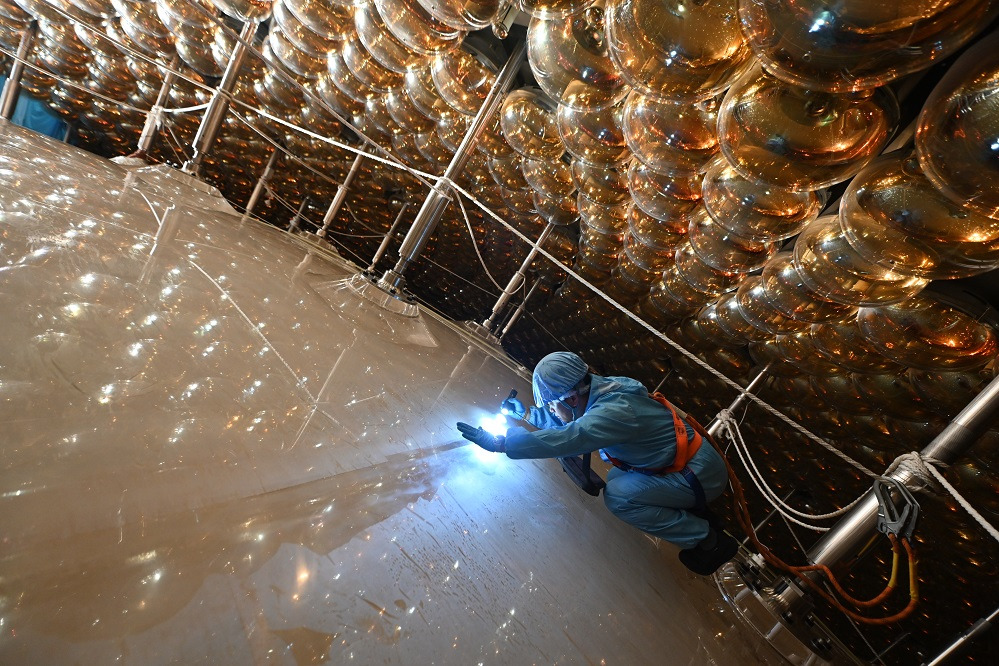TIME TO CHILL OUT
Winter looms as the fall prepares to depart, with a colorful and harmonious farewell, Zhang Lei reports.

Frost's Descent, the poetic term for fall's last solar term, is often deemed a prelude to winter. When the sun reaches the celestial longitude of 210 degrees, direct sunlight point is far from the Northern Hemisphere and its ability to heat is diminished. A distinct chill appears in the air. This year the solar term falls on Sunday.
Colors on the streets, too, change with a touch of orange-red appearing.
In a fruit store at a street corner in Beijing, the brightly colored persimmons take on the important task of attracting customers with their highly saturated "orange beauty"; on the city's supermarket shelves, the frosty persimmons release their sweet scent; milk tea shops launch their specially blended persimmon drinks in the hope of drawing in more customers; and even in barbecue restaurants, eating hot charcoal-grilled persimmons with a small spoon is more than just a passing fad.
In many parts of the country, especially in the north, there is a custom of eating persimmons on the day of Frost's Descent. The locals believe that eating persimmons on this day will prevent a runny nose in the winter and prevent lips from becoming dry for the entire season.
Zhu Yuanzhang, the founding emperor of the Ming Dynasty (1368-1644), came from a poor family. One year, on Frost's Descent, Zhu, who hadn't eaten food for two days, was so hungry that he almost lost consciousness. When he stumbled into a small village, his eyes suddenly lit up when he saw a persimmon tree growing in a rotten tile pile.
Zhu ramped up all his strength to climb up the tree to gorge himself on persimmons, saving his life. Later, after he became the emperor, when he was leading his troops through that very village on the day of Frost's Descent, he found the persimmon tree was still there, and it was still covered with bright red persimmons.
He slowly took off his red gown, climbed up again, solemnly put the gown on the tree, and named it Lingshuang Hou, or frost marquis.
After the story spread among the people, the custom of eating persimmons on Frost's Descent was born.
Ancient observation
In late autumn, frost falls. Its whiteness decorates reeds, the seeds of the foxtail grass and the tips of the thatch leaves, and covers the fields.
The words from the poem Jian Jia (Reeds) in Shijing (The Book of Songs), the oldest collection of Chinese poetry dating back to the Western Zhou Dynasty (c.11th century-771 BC), highlight the nuanced observation of nature.
"Green, green the reed.
Dew and frost gleam.
Where's she I need.
Beyond the stream."
The poem portrays the dark before the dawn.
Folklore expert Xiao Fang explains: "Frost starting to appear on Frost's Descent originally reflects the climate of the Yellow River basin area, but in most parts of China, it is the day when cold weather truly arrives, and there is a folk saying that goes 'frost descends, move flowers into the house'."
Every year during this period after the late rice harvest, in Guangxi Zhuang autonomous region, villagers, who have worked for a year, hold the Zhuang Frost's Descent Festival. It was originally a ritual of the Zhuang people to reward nature and celebrate the harvest, expressing their good wishes for a bumper crop, and later it developed into a sacrifice to heroes interwoven with folk activities and cultural performances. The festival is popular in Tiandeng, Daxin, Debao, Jingxi, Napo counties in Guangxi, as well as in eastern parts of Yunnan province.
In 2014, the Zhuang Frost's Descent Festival was included into the national intangible cultural heritage representative list as an extension of the 24 solar terms.
The festival in Xialei township in Daxin county is particularly grand. It lasts for three days and is divided into "head descent", "formal descent" and "tail descent". People eat glutinous rice balls, have duck and burn incense to ancestors to herald a prosperous year.
On the first day, every family makes rice dumplings and cakes for relatives and friends. Street stalls are set up early in the morning, and all manners of production and living utensils are up for sale. The second day is devoted to worships and parades. In the evening, it is a time for a variety of cultural and entertainment activities. A stage is set up in the open space of the square, and a local opera is performed for the seniors, while the young people sing folk songs elsewhere. Singing in antiphonal style continues until the end of the third day. At the same time, a series of traditional cultural and sports events such as rock-climbing competitions, basketball, tug-of-war, Zhuang cockfighting, stilt-walking and spinning tops are held.
However, a custom on Frost's Descent that was popular in Jiangsu province before the Qing Dynasty (1644-1911) is little known today. In ancient times, Start of Spring was the day to "start the army", and Frost's Descent was the day to "withdraw the army". On this day, the local garrison would hold an elaborate closing ceremony termed "fighting frost fall". At dawn, the general would lead the officers and soldiers in full armor to salute the flag, and then set off muskets and artillery. The surroundings were crowded with spectators, and people judged the volume of the guns to predict the abundance of food in the coming year. It is said that after the ceremony, thieves and bandits did not dare to cause havoc, and even the god in charge of frost in heaven did not dare to put frost on the crops.
For Frost's Descent, the ancient Chinese recorded three most interesting phenomena of the solar term: The jackal will display the prey it has captured before eating it; the leaves on the ground will wither and fall and dormant insects will stay still in the cave and go into hibernation.
Frost's Descent is a term that is closely related to the climate, phenology and products of the season, and it reflects people's wisdom and desire for peace and health to live in harmony with nature.
Replenishment
During the period of the solar term, most flowers are withering and falling, but chrysanthemums still grow and bloom. It is precisely because of this characteristic that the ancient literati cherished them. Yuan Zhen, a poet in the Tang Dynasty (618-907), praised chrysanthemums for their fearless and lofty character. Even to this day, people's love for the flower has not diminished. In many regions, chrysanthemum festivals are held at this time, and the flowers are often appreciated in the company of quality wine.
The Chrysanthemum Festival in Xiaolan township, Zhongshan, Guangdong province is among the most celebrated events in the region. It was founded in the Southern Song Dynasty (1127-1279). It is one of the oldest and largest chrysanthemum festivals in China. In 2006, it was included in the first batch of the national intangible cultural heritage list. Chrysanthemums also convey the meaning of auspiciousness and longevity, and were considered a symbol of vitality.
It is deemed an important time for "autumn replenishment" to prepare for the looming winter. Many places have a custom of eating beef and duck to build up resilience. In Yulin, Guangxi, people have fried beef noodles for breakfast and beef brisket pot for lunch and dinner. In Fujian province, duck is the preferred choice.
Guo Wenbin, a scholar of the 24 solar terms, says the focus of healthcare is to prevent cold, dryness and depression.
"The top priority is to keep warm. At this time, the weather is changeable, and the temperature often rises and falls sharply. Especially for the elderly, special attention should be paid to keeping the stomach and feet warm. It is best to develop the habit of soaking feet in hot water before going to bed to avoid suffering from bad circulation in later life. Proper intake of beef and mutton can increase energy. People should focus on food that nourishes the spleen and stomach. Newly harvested chestnuts are a good tonic for this season."
In Xi'an, Shaanxi province, the locals elevate the season with the fusion of persimmon and flour in the shape of the city's staple snack — persimmon huta paste.
In front of a food stall, an elder woman mixes peeled persimmon pulp and flour without adding a drop of water, stirs into a paste, and puts the batter into a portable device. This is a tool for frying the persimmon paste, similar to a flat spoon. The fried persimmons are golden on both sides, crispy on the outside and soft on the inside.
When it comes to preserving the taste of persimmons, locals in Fuping county, Shaanxi, take a different approach. The persimmons here are not fried, but naturally hung and dried. After Frost's Descent, persimmons go through 12 processes such as picking, screening, peeling, hanging, kneading, and frosting, and drying for 48 days. With bright and red pulp, a layer of white icing sugar is applied and they are hung up. These persimmons can be preserved for nearly eight months.
Perhaps, only the fiery red persimmons hanging under the eaves during Frost's Descent are one of the more pleasant reminders that the fall is about to depart.
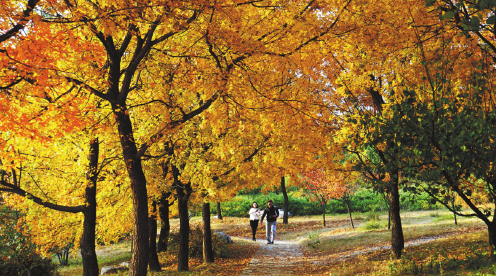

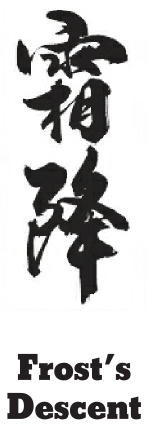
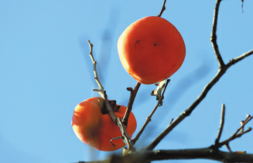
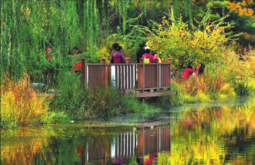
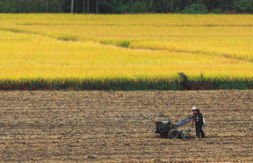
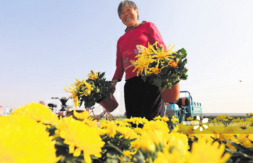
Today's Top News
- A misjudgment of situation in the first place, destabilizing AUKUS deal may bite the dust: China Daily editorial
- Welcome would be welcomed if sincere: China Daily editorial
- Xi and his wife meet Cambodian King, Queen Mother
- Xi meets Russian State Duma chairman
- Parade a tribute to Chinese people's sacrifices in WWII
- SCO will strongly uphold multilateralism

















